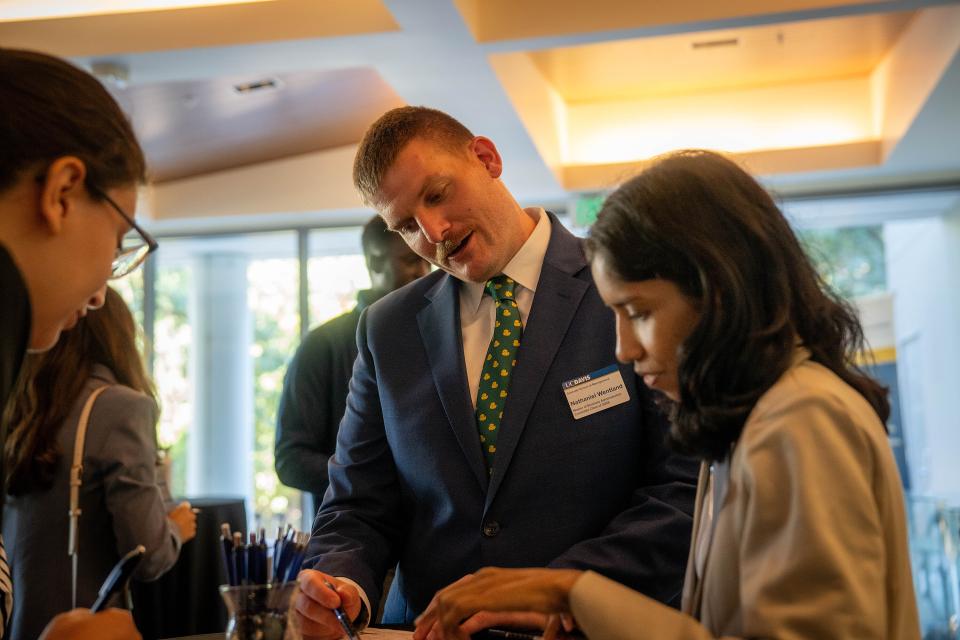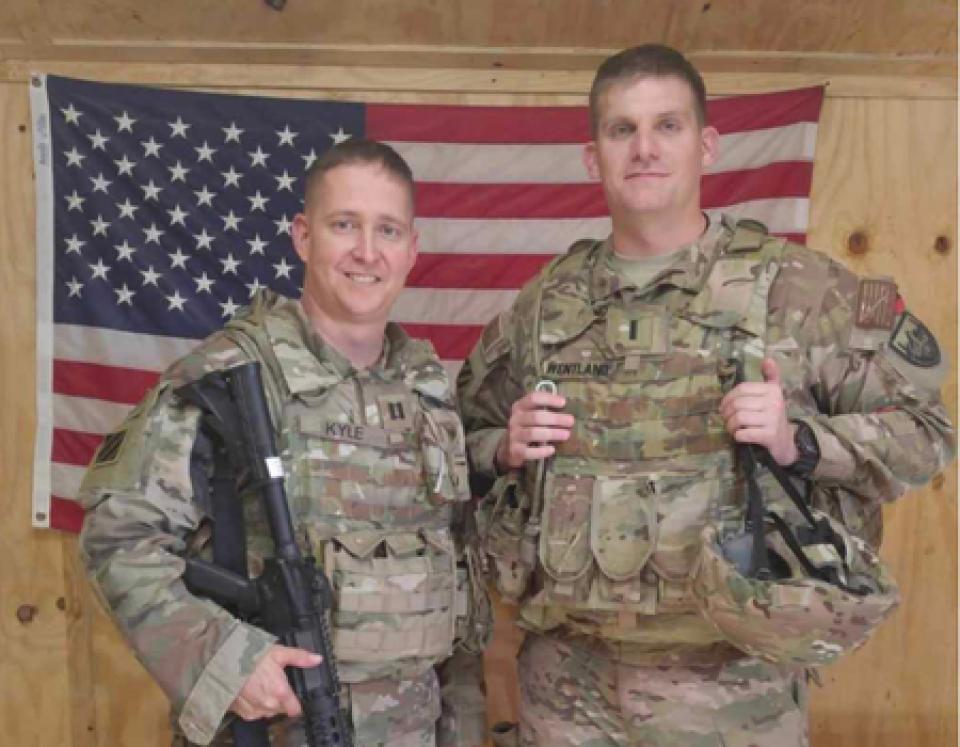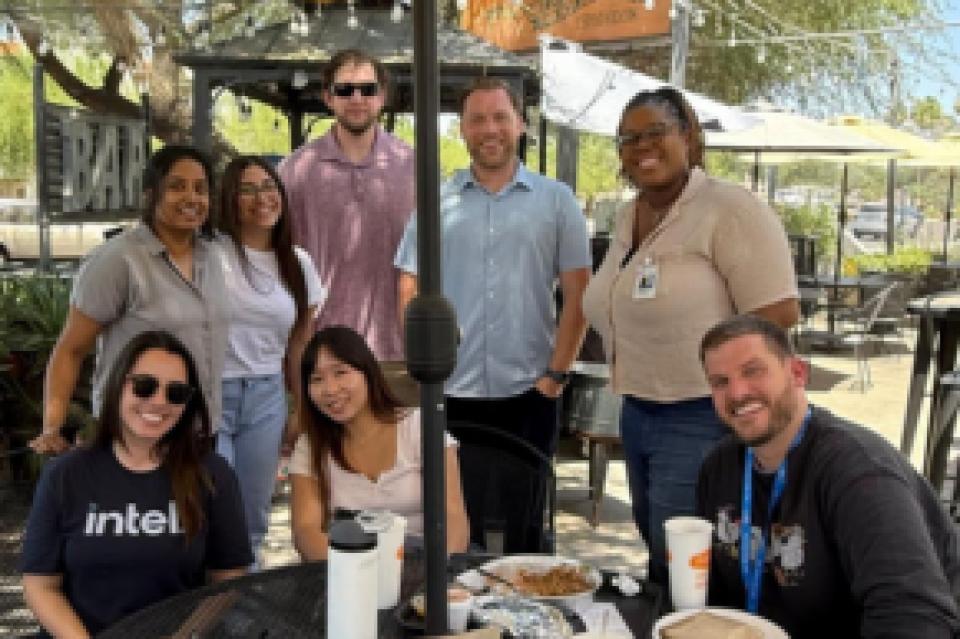After a Decade at Sea, Intel Internship Opens New Opportunities
My pivot from Navy Reserve to the world of Big Tech

This summer I wrapped up my first career experience outside the maritime world. In fact, it was my first job not connected to ships or ports since I worked at McDonald’s in high school about 15 years ago. For more than a decade, my work was defined by life at sea as a merchant mariner and my service in the Navy Reserve.
When I started my Full-Time MBA at UC Davis, one reason it felt like the right place was its commitment to veterans. Serving as a peer advisor at the UC Davis Veteran Success Center gave me a chance to give back to the military-affiliated community while building new connections on campus.
Jumping into a corporate role as a supply chain intern at Intel was both exciting and intimidating. It felt like a huge milestone and gave me the kind of growth I was hoping for when I came to UC Davis.
Classmates and Community are the Best Prep for Interviews
The interview process was my first taste of the fast-paced recruiting world in tech. To get ready, I leaned on classmates to practice and on the veteran community for advice and mentorship.
A special thanks goes to my classmates who listened to me practice my pitch in a parking lot before and after classes.
What I learned is that practice matters. The more I told my story and explained how my background connected to supply chain work, the more confident I felt.
My advice to incoming students is simple: do not prepare alone. Use the people around you who want to see you succeed.

Applying AI and MBA Skills to a $30 Million Project
At Intel, I worked on a project mapping the supply chain of a $30 million commodity. I traced it from where the raw material came from, through manufacturing and processing, and all the way to how Intel consumes it in production. From there I built a should-cost model to break down the cost structure. That analysis helped Intel decide whether it should consider sourcing the commodity from another supplier.
The internship gave me a front row seat to how Intel strategizes its materials and the decisions that go into keeping supply reliable.
The class that helped me more than I expected was Articulation and Critical Thinking with Lecturer Brian Kennedy—not a technical course, but one focused on soft skills that proved to be essential.
In that class, we practiced spotting fallacies, thinking in different ways and learning how to ask better questions. I showed up at Intel with zero experience in tech, but I leaned on soft skills every day there. The way I asked for clarification or pushed for more information was more thoughtful. It was never like “throwing spaghetti at the wall.” I felt like I always had a good question that moved the conversation forward.
Another big connection was with how UC Davis professors encouraged us to think about the role of AI, whether as a tool to research, to analyze or to frame a problem differently.
At Intel, I applied classroom lessons to a $30 million project. AI was no longer a theory. It became a practical way to think about data and decisions.
Adjusting to a New Culture at Intel
One of the biggest challenges was adjusting to an entirely new culture. I came from two very different environments: the military, which is authoritative and regimental, and the maritime industry, which runs on union culture and the rhythms of sea life.
I was already wearing two uniforms, and then Intel felt like putting on a third. Intel has a unique culture, its own language and its own timelines. Learning the jargon, the way people framed problems and how fast things moved was a real adjustment, but it gave me a new appreciation for adapting quickly.
Career Goals and Next Steps
This internship showed me how my background in logistics and operations can translate into new industries. I would love the chance to return to Intel in the future, but I am also excited to explore opportunities across the broader supply chain and business strategy space.

My goal is to take my 10 years of leadership and management at sea, combine it with my MBA and what I learned in tech this summer, and apply it to new challenges. The mix of problem-solving and strategy is exactly where I want to be.
Connections and Questions Paved the Way Forward
For future GSM students, my advice is to:
- Lean on classmates. One of my classmates even helped connect me to an Intel recruiter, which moved me past the first steps.
- Ask questions. Some of my best learning came from admitting I did not know something and letting a teammate walk me through it.
Looking back, I am grateful for the chance to step into a new industry and to learn from so many talented colleagues at Intel.
The maritime industry taught me logistics, operations and crisis management under pressure. The MBA program taught me how to translate those skills into corporate language and strategic thinking.
Together, they opened doors I never imagined possible.


